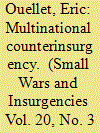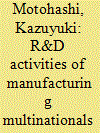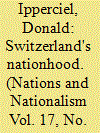|
|
|
Sort Order |
|
|
|
Items / Page
|
|
|
|
|
|
|
| Srl | Item |
| 1 |
ID:
085370


|
|
|
|
|
| Publication |
2009.
|
| Summary/Abstract |
In this article, the authors aim to apply well-known concepts of managerial work to the military. The concepts and methods used are derived from Henri Mintzberg, who paved the way in discovering the "nature of managerial work." The data are based on closely observing two commanding officers at Kabul International Airport, operated by the International Security Assistance Force. Those managers play different managerial roles, and the ability to develop three types of roles-informational, interpersonal, or decisional- depends on their hierarchical level, their own functional area, and the complex environment of the military compound. Compared to conventional managers, military managers during multinational deployments have to cope with specific features such as the importance of language and communication skills (information roles), boredom among the workforce (interpersonal roles), as well as suddenly occurring emergencies and multiple ("political") authority lines inside and outside the mission area (decisional roles).
|
|
|
|
|
|
|
|
|
|
|
|
|
|
|
|
| 2 |
ID:
092307


|
|
|
|
|
| Publication |
2009.
|
| Summary/Abstract |
This article proposes a case study of the multinational counterinsurgency operations that occurred in China during the Boxer Rebellion in 1900-1, to provide a better understanding of the political and military dynamics specific to this type of mission. The study focuses primarily on the nature of the cooperation on the ground, the various national approaches to counterinsurgency, and the asymmetry of strategic approach between the Westerners and the Chinese. A discussion is also proposed, highlighting that combined counterinsurgency is not per se an obstacle to the unity of command, but that politically international coalitions create unique challenges to counterinsurgency operations.
* Views and opinions expressed in this text are those of the author and do not represent, or otherwise reflect, any official opinion or position of the Department of National Defence or the Government of Canada. Reproduced with permission of the Department of National Defence, Government of Canada.
|
|
|
|
|
|
|
|
|
|
|
|
|
|
|
|
| 3 |
ID:
099910


|
|
|
|
|
| Publication |
2010.
|
| Summary/Abstract |
This paper investigates the R&D motivations of various multinationals operating in China, drawing on a large-scale, firm-level dataset of official Chinese statistics on science and technology activities. The present study shows that R&D efforts in China have intensified for both foreign-owned and domestic firms, but less so for foreign-owned firms, perhaps because foreign-owned firms tend to operate on a foundation of technological capabilities developed within their home countries.
Statistical analysis confirms that the major motivations for foreign R&D in China are production-driven, not market-driven or technology-driven. Nevertheless, one sees significant variations in foreign R&D strategies from region to region. Guangdong is characterized by production-driven R&D. In Beijing, R&D strategies tend to take a technology-driven approach, drawing on the clusters of scientific institutions. In Shanghai, the R&D efforts of multinationals tend to focus on support for market-driven R&D.
|
|
|
|
|
|
|
|
|
|
|
|
|
|
|
|
| 4 |
ID:
107276


|
|
|
|
|
| Publication |
2011.
|
| Summary/Abstract |
In this article, I explore the subject of Switzerland's nationhood in light of a theoretical approach based on normative principles. This approach has the advantage of avoiding the definitional conundrum arising from the plurality of purely descriptive (often historical) definitions of nationhood. Instead, in accordance with certain normative inferences concerning what the nation ought to be given the principles of democracy, law and inclusion, it portrays the nation as a political entity having the largest possible group of individuals instituting a space of public discussion within a state. In this normative definition, attention should be drawn to the concept of 'space of public discussion', which, to my mind, entails the existence of a common public language used by its citizens - something notably different from either the multilingualism of the elite or a common parliamentary language. Proceeding in this way, I will defend the idea that Switzerland is a multinational state on the basis that cantons may be considered small nations, although certain pressures on the boundaries of the cantonal public spaces tending to expand them to the whole of the linguistic region must also be taken into
|
|
|
|
|
|
|
|
|
|
|
|
|
|
|
|
|
|
|
|
|